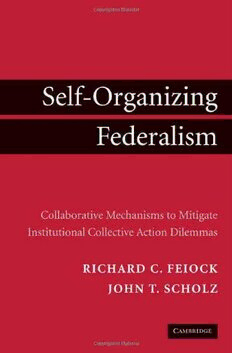Download Self-Organizing Federalism: Collaborative Mechanisms to Mitigate Institutional Collective Action Dilemmas PDF Free - Full Version
Download Self-Organizing Federalism: Collaborative Mechanisms to Mitigate Institutional Collective Action Dilemmas by Richard C. Feiock, John T. Scholz in PDF format completely FREE. No registration required, no payment needed. Get instant access to this valuable resource on PDFdrive.to!
About Self-Organizing Federalism: Collaborative Mechanisms to Mitigate Institutional Collective Action Dilemmas
This book investigates the self-organizing responses of governments and interests to the institutional collective action (ICA) dilemmas of particular concern to students of federalism, urban governance, and regional management of natural resources. ICA dilemmas arise in fragmented systems whenever decisions by one independent formal authority do not consider costs or benefits imposed on others. The ICA framework analyzes networks, joint projects, partnerships, and other mechanisms developed by affected parties to mitigate ICA decision externalities. These mechanisms play a widespread but little-understood role in federalist systems by reshaping incentives in order to encourage coordination/cooperation. The empirical studies of urban service delivery and regional integration of regional resource management address three questions: How does a given mechanism mitigate costs of uncoordinated decisions? What incentives do potential members have to create the mechanism? How do incentives induced by the mitigating mechanism affect its sustainability in a changing environment and its adaptability to other ICA dilemmas?
Detailed Information
| Author: | Richard C. Feiock, John T. Scholz |
|---|---|
| Publication Year: | 2009 |
| ISBN: | 9780521764933 |
| Pages: | 367 |
| Language: | English |
| File Size: | 3.27 |
| Format: | |
| Price: | FREE |
Safe & Secure Download - No registration required
Why Choose PDFdrive for Your Free Self-Organizing Federalism: Collaborative Mechanisms to Mitigate Institutional Collective Action Dilemmas Download?
- 100% Free: No hidden fees or subscriptions required for one book every day.
- No Registration: Immediate access is available without creating accounts for one book every day.
- Safe and Secure: Clean downloads without malware or viruses
- Multiple Formats: PDF, MOBI, Mpub,... optimized for all devices
- Educational Resource: Supporting knowledge sharing and learning
Frequently Asked Questions
Is it really free to download Self-Organizing Federalism: Collaborative Mechanisms to Mitigate Institutional Collective Action Dilemmas PDF?
Yes, on https://PDFdrive.to you can download Self-Organizing Federalism: Collaborative Mechanisms to Mitigate Institutional Collective Action Dilemmas by Richard C. Feiock, John T. Scholz completely free. We don't require any payment, subscription, or registration to access this PDF file. For 3 books every day.
How can I read Self-Organizing Federalism: Collaborative Mechanisms to Mitigate Institutional Collective Action Dilemmas on my mobile device?
After downloading Self-Organizing Federalism: Collaborative Mechanisms to Mitigate Institutional Collective Action Dilemmas PDF, you can open it with any PDF reader app on your phone or tablet. We recommend using Adobe Acrobat Reader, Apple Books, or Google Play Books for the best reading experience.
Is this the full version of Self-Organizing Federalism: Collaborative Mechanisms to Mitigate Institutional Collective Action Dilemmas?
Yes, this is the complete PDF version of Self-Organizing Federalism: Collaborative Mechanisms to Mitigate Institutional Collective Action Dilemmas by Richard C. Feiock, John T. Scholz. You will be able to read the entire content as in the printed version without missing any pages.
Is it legal to download Self-Organizing Federalism: Collaborative Mechanisms to Mitigate Institutional Collective Action Dilemmas PDF for free?
https://PDFdrive.to provides links to free educational resources available online. We do not store any files on our servers. Please be aware of copyright laws in your country before downloading.
The materials shared are intended for research, educational, and personal use in accordance with fair use principles.

